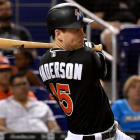From a national perspective, there hasn't been much reason to pay attention to the Miami Marlins this season -- at least not for reasons beyond if and when they'll trade J.T. Realmuto, Justin Bour, and Kyle Barraclough. The Marlins are on pace to win just 66 games, a figure likely to go down, and they're years from having a roster that brims with promising young players.
Be that as it may, the Marlins do have a present-day rook performing well enough to merit a closer look: outfielder Brian Anderson, who might be the most underappreciated rookie in the game.
Anderson entered Tuesday hitting .284/.360/.416 with seven homers in 400 plate appearances, and was in a tie with Cardinals outfielder Harrison Bader for the most wins above replacement (2.3) among rookies. (Bader's figure is propped up by defense, as Anderson has 20 more points of on base percentage and two more points of slugging.) He ranks fifth among rookies with more than 100 plate appearances in batting average, fourth in on-base percentage, and 16th in slugging.
Though Anderson showed power potential last season, when he posted a .217 ISO in the upper minors, he's settled in as a gap-to-gap hitter so far in his big-league career. He's atoned for that deficiency by employing a disciplined approach. For reference, his chase rate is 20.5 percent, or nearly eight percentage points better than the league-average mark. Anderson also swings and whiffs at lower rates than the typical hitter, and grades well so far as quality of contact goes.
The oddest part of Anderson's season came back in May, when the Marlins shifted him from third base, where he was well-regarded by public prospect evaluators, to right field, which he hadn't played since college. His arm is plenty good enough to man the position, but he isn't fleet of foot. The early returns haven't been promising. (Statcast, for instance, has him ranked among the worst defenders in the game.) That the Marlins moved Anderson out of deference to Martin Prado, whose productive days seem behind him, is all the more puzzling.
Wherever Anderson lands on defense, the pressure will be on his bat. He'll need to tap into his raw strength or prove he can maintain his batting average to remain a plus on offense. In that sense, it's understandable why he remains underappreciated: for as good as his performance has been, there are sustainability questions that only time can answer.


















